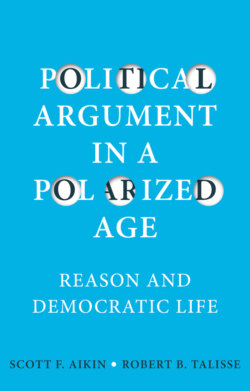Читать книгу Political Argument in a Polarized Age - Scott F. Aikin - Страница 6
1 Democracy in Dark Days
ОглавлениеThis is not another how to save democracy book. Perhaps you are familiar with that type of book – the author laments the decline of some democratic norm, intones gravely about where the current trajectory takes us, and then outlines a set of fixes. There is, unsurprisingly, a small industry of books that follow this formula. They sell. They function as a kind of self-help for the political class. Now, that’s not a bad thing by any means, but we think there is a false premise behind it all. Democracy can’t be fixed.
So this clearly isn’t a book about how to save democracy. What is it, instead? Well, it’s not a case against democracy, either. Just because democracy can’t be fixed, it doesn’t follow that we should do away with it. This is because doing away with democracy requires that we put something else in its place, something that there’s sufficient reason to think is superior to democracy. But this comparative work is fraught. Notice that the relevant comparison is not between real-world democracy and some idealized nondemocratic alternative. Instead, the relevant comparison is between democracy as it presently functions and some envisioned alternative as it would function were it instated. When the comparison is performed properly, democracy comes out on top. So this isn’t an anti-democracy book; we think there is no better political arrangement than democracy, even when it is functioning poorly.
This isn’t a saving democracy book, and it’s not a down with democracy book. So what is it? Well, it’s complicated, but that’s what happens when you ask tough questions that do not admit of simple answers. In fact, we hold that one of the problems with democracy is that it encourages citizens to expect there to be simple answers to complicated political questions. Hence the popularity of the two genres we have mentioned; the literature of both saving democracy and down with democracy is driven by the demand for easy answers.
Still, something should be said at the start about what this book is about. The view we will present can be sketched as follows. We understand democracy to be the proposal that a stable and decent political order can be sustained by equal citizens who nonetheless disagree, often sharply, about the precise shape their collective life should take. On this view, political disagreement among political equals is central to democracy. Disagreements of this kind are the engine of collective self-government. However, the practices associated with political disagreement and the freedoms guaranteed to citizens that enable them to engage in political argumentation – particularly, freedoms of conscience, expression, and association – create the conditions under which the democratic citizenry fractures into hostile and opposed factions. For reasons we will explain in these pages, political factions have a tendency to transform their members into polarized extremists who grow incapable of seeing their political opponents as fellow citizens. Yet maintaining a commitment to the political equality of our political opposition is the central demand of the democratic ethos, the ethos of the democratic citizen.
Note the tragic irony. Our enactment of democratic citizenship leads to the kind of polarization that dismantles our democratic capacities. We recognize the central democratic freedoms precisely because collective self-government among equals needs citizens to deliberate and argue together about matters of public concern. But in order to argue well together, citizens must be able to access and process the reasons and evidence that are relevant to their disputes; and they must engage with one another. The need to engage in argument with those with whom one disagrees prompts certain forms of democratic dysfunction. In particular, we will focus in this book on the ways in which the need to engage in such argument creates the occasion for simulated argument, mimicked political engagement. These are processes and practices that are designed to look like political argumentation among equal citizens that are in fact strategies for avoiding and shutting down such engagement. When authentic political argumentation is successfully shut down in this way, opposing factions polarize, democratic capacities are dismantled, and citizens become increasingly incapable of the real thing. Democracy thus is undermined from within.
It’s important to emphasize that this dysfunction is a product of democracy, not the work of some alien and counter-democratic political ideal. And it is not an accidental product of democracy. It is a product of democracies as democracies. The fact is that we factionalize and polarize as a consequence of sincerely trying to enact democratic citizenship properly. It’s not a fact of disproportionate wealth distributions or caused by racism or regionalism, though these factors certainly hasten it. No, it’s a feature of democracies as democracies, because this kind of disagreement is central to the democratic project, and the pathologies of political argument are consequences of democratic freedoms. This is why democracy cannot be saved, at least not in the way that animates much of the current literature devoted to saving it. Fractious disagreement is an essential cog in the machinery of democratic politics. Fixing democracy cannot be a matter of quelling or sidelining our political disagreements. A political order without real disagreement and disputes in which participants get heated is no democracy at all. The trick is to find a way to conduct disputes of that kind while also sustaining our respect for the political equality of our opposition. Although we employ the term advisedly, we claim here that the task is to formulate a workable conception of civil political disagreement. More on that term shortly. But, again, however, this is not a promise of saving democracy, but of managing the symptoms of its core problem.
